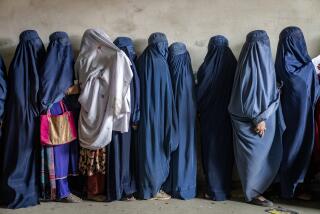Bhutto Proposes Legal Reforms to Aid Pakistani Women
- Share via
ISLAMABAD, Pakistan — Many women felt Prime Minister Benazir Bhutto ignored their problems in her first term and are pressing her this time to overhaul a legal system that openly discriminates against them.
The Bhutto Administration of 1988-90 did not pursue major reforms to help women, but she has proposed several such measures since returning to power last year. Most are linked to the police and courts.
She opened the first all-female police station not long ago, plans several more in major cities and has reserved 15% of all new police jobs for women. Bhutto also promises to appoint women to the Supreme Court and create special courts for crimes against women.
“Women have always been treated like criminals,” the prime minister said at the new station in Rawalpindi. “A woman’s police station is the first step toward equal access to justice.”
Most of Pakistan’s women are poor and uneducated. It is still common for them to marry at puberty and to spend their entire lives at home. They seldom find justice when they take their cases to police, according to the independent Human Rights Commission of Pakistan.
“Violence against women . . . remained among the commonest of crimes and took some of the ugliest forms” in 1993, the commission said in its annual report.
The report said police seldom investigate the most serious crimes, such as acid attacks and rape, and that convictions are difficult to obtain.
Under Islamic law, a woman must produce four male witnesses to get a rape conviction. Because that is rare, the victim often is convicted of having consensual sex outside marriage, a serious crime in this Muslim nation.
Changing laws based on the Koran, the Muslim holy book, could be Bhutto’s biggest challenge. So far, she has been reluctant to challenge religious leaders.
More to Read
Sign up for Essential California
The most important California stories and recommendations in your inbox every morning.
You may occasionally receive promotional content from the Los Angeles Times.













